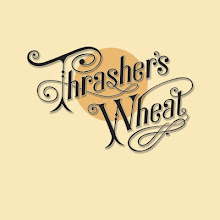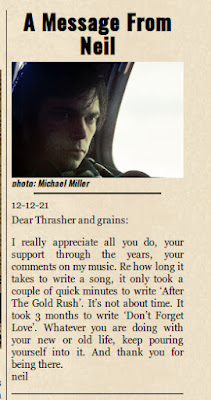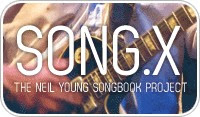Comment of the Moment: VIDEO - David Bowie ‘Heroes’: Bridge School Benefit Concert 1996
Last week, we posted on VIDEO - David Bowie ‘Heroes’: Bridge School Benefit Concert 1996 (concert review).
Here is the Comment of the Moment by Ian (The Metamorphic Rocker):
I was recently watching the film "The Man who Fell to Earth" (1976), which stars Bowie as an alien undercover on earth as a businessman trying to get water back to his home planet where his people are dying from a drought.Thanks as always Meta Rocker! It's been awhile since we saw "The Man who Fell to Earth". Probably last saw a rep cinema back in the 80's?
Toward the end of the movie, Bowie's character releases an album titled "The Visitor", hoping the wife he left behind on another planet will one day hear his music "on the radio". Gave my a smile, to say the least.
"Like visitors from space, it's hard to find a place to blend in and go unrecognized." And the late Nicolas Roeg, who directed he Bowie movie, had an idiosyncratic visual style--much of it based on non-linear and associative thinking-inspired editing--that chimes well with Neil's description of "war inside pictures in my brain". Sequences of the film involve Bowie's character watching banks of TVs tuned to different channels--does this remind you of anyone?--while imploring all the people on the screens to get out of his head and leave him alone. It seems Newton, Bowie's character, has some form of alien telepathy that acts like a psychic Midas Touch throughout the movie, putting him into mental contact with people to whom he has only tangential connections.
Roeg's use of montage and fragmented inter-cutting, in turn, become an expression of this fractured and overwhelmed mental state. Imagine being directly, intimately, vividly hooked into every person, every bit of data the outside world throws at you on a daily basis. That's "The Man who Fell to Earth" and also, I would argue, what NY and other artists probably feel like at times. "How you change, how you change, and how you rearrange, everything that touches me." But I digress.
There are non-linear and fragmented aspects of Neil's songwriting that don't get discussed too often, but I believe Neil has obliquely mentioned that his songs tend to jump around in time and space: After the Gold Rush and Trans Am are two, far-flung examples that come to mind. But for me, Without Rings (quoted above) and AYP?'s title song are the two that may come the closest to directly grappling with the tenuous, organically-shaped, fever-dream stimulation of a creative mind. No Hidden Path is up there as well, and in fact the entire CDII album is so idiosyncratically and quintessentially Neil (as I know his work), I'd like to write an entire post about it some time.
Thanks, thrasher, for inspiring this little stream of consciousness (for lack of better term) on my part. I guess my theme is the receptive state of the artistic or creative brain. Call it the Muse or "your brain on art"--it can be something of a drug, the dizzying (over)saturation of ideas, emotion, and sensation producing a natural high, perhaps paradoxically akin to the radical shutting off of intellectual and sensory faculties that's the aspiration of transcendental meditation. "Nothing" is just as titillating to the neural pathways as feeling/hearing/seeing everything at once, because both states represent sensory extremes that can be simultaneously frightening yet somehow enticing, sort of like how all the information on a TV screen--if you could look closely enough--breaks down into millions of tiny dots of color and noise. Nothing and everything are the same quantity viewed from different perspectives, because nothing is anything until the "pictures in our brain" pull it into focus.
~Through the keyhole in an open door.
To your points here on Neil as time traveler. Your timing is impeccable as we're trying to complete a rather major TW post paralleling many of the themes here with Bowie, Nicolas Roeg, Neil and time travel.
VIDEO - David Bowie ‘Heroes’: Bridge School Benefit Concert 1996 + Bridge Concert Memories
— ThrashersWheat (@ThrashersWheat) July 19, 2020
See https://t.co/kmdJMjHSNr
☮️♥️@NeilYoungNYA @pegiyoung @bridgeschool @DavidBowieReal pic.twitter.com/RRZs60iXxg
As sort of a tangential preview on that, you may recall some our analysis on this last year on Zuma: Time Traveling with Neil Young which keyed off this 'graf:
In 1975, when Rolling Stone writer Cameron Crowe asked Neil Young about his forthcoming album, Young said “I think I’ll call it My Old Neighborhood. Either that or Ride My Llama.” That album would be released as Zuma in November of that same year, and as Young says in the interview, “It’s weird. I’ve got all these songs about Peru, the Aztecs, and the Incas. Time travel stuff.”Well, not to get too far out -- or too far gone more than usual -- here's a few of our various ramblings on Neil Young and time travel for your general amusement:
- LYRICS ANALYSIS: "After The Goldrush"
- The Story of Neil Young’s Heavily Computerized, Utterly Bewildering ‘Trans’
- "TRANSCRIPT: Neil Young's Track by Track Commentary on New Album 'Hitchhiker' .
- TRANS: A Little Bit of Essential Neil Young | Rocket 88
- ZUMA Payload for SpaceX Rocket: Is There A Connection to "The Visitor" in November?
- NEW ALBUM: ‘The Visitor’ by Neil Young + Promise of the Real
- Time Travel Comments on Stills-Young Band by Jim M.
- Time Travel Comments on Hitchhiker by Jim M. "Captain Kennedy" & Neil Young's "Hawks & Doves": Which Side Will You Choose?
Labels: benefit, bridge school, concert, david bowie, neil young, pegi young, review, time travel, video


































































 Human Highway
Human Highway

















 Concert Review of the Moment
Concert Review of the Moment





 This Land is My Land
This Land is My Land

 FREEDOM In A New Year
FREEDOM In A New Year









 *Thanks Neil!*
*Thanks Neil!*




![[EFC Blue Ribbon - Free Speech Online]](http://www.thrasherswheat.org/gifs/free-speech.gif)











 The Unbearable Lightness of Being Neil Young
The Unbearable Lightness of Being Neil Young Pardon My Heart
Pardon My Heart



 "We're The Ones
"We're The Ones  Thanks for Supporting Thrasher's Wheat!
Thanks for Supporting Thrasher's Wheat!




 This blog
This blog 
 (... he didn't kill himself either...)
#AaronDidntKillHimself
(... he didn't kill himself either...)
#AaronDidntKillHimself








































































 Neil Young's Moon Songs
Neil Young's Moon Songs




 Civic Duty Is Not Terrorism
Civic Duty Is Not Terrorism Orwell (and Grandpa) Was Right
Orwell (and Grandpa) Was Right


 What's So Funny About
What's So Funny About 


